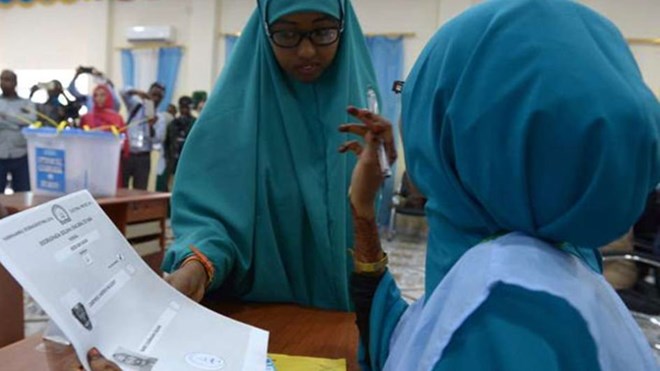
Monday June 8, 2020

A Somali polling agent (right) explains the voting procedure to a voter before she casts her ballot in Baidoa. Somalia is in the process of selecting a new parliament, upper house and president in a limited franchise election that involves 14,000 delegates from all regional states, including Galmudug and Puntland. PHOTO | SIMON MAINA | AFP
BAIDOA
With its security-sealed plastic boxes and cardboard polling booths, Somalia's election - under way since last month and still ongoing - has the trappings of democracy, but few of the functions.
Last week in the western city of Baidoa, 51 handpicked representatives of the Reer Aw Hassan clan took an hour to vote unanimously for Abdiweli Ibrahim Ali Sheikh Mudey, a current minister and the only candidate to show up on the day.
Among Mudey's backers were 15 enthusiastic female voters. "We selected the most beautiful man!" cheered one as Mudey smiled in his dark aviator sunglasses, a garland of purple tinsel round his neck.
Just 14,025 of the Somalia's perhaps 12 million citizens are voting for 275 MPs, who will join 54 appointed senators in voting for a new president, in an election described as "limited".
"It is a unique process and must be analysed within its uniqueness," said Deqa Yasin, the deputy chair of the national election body, the Federal Indirect Election Implementation Team.The voting process has been drawn-out and deadlines repeatedly missed, and it is unclear when the presidential stage will take place.
Somalis were promised a one-person, one-vote election.
But political infighting, backsliding and prevarication, combined with insecurity mainly due to Shabaab militants who control swathes of countryside and strike at will in Mogadishu and other towns, meant that plan was ditched last year.
Instead a complicated hotchpotch is in place.
It falls far short of a democratic election, but promises to be better than the last vote in 2012, when 135 clan elders nominated all the MPs.
CLAN CONTROL CONTINUES
In the absence of parties, clans remain at the heart of the process. MP's seats are divvied up according to region and clan, with candidates voted for by "electoral colleges" of 51 representatives selected by elders.
That makes it roughly 100 times more inclusive than 2012, as officials are keen to point out.
Often the vote itself is ceremonial, with the winner negotiated in advance followed by the ritual placing of slips in ballot boxes.
In another country the election might be dismissed as a sham, but Somalia's long history of conflict means this is being counted as progress.
"My voice mattered in this election," said Halima Suleiman, a 31-year-old woman who also voted for Mudey. Like her, many of those chosen to vote hail from Somalia's international diaspora.
Mohamed Abdi Omar, an elder, said: "This is the first time we have seen people selecting their candidates."
Somalis queued to vote in 1969 but since then civil war, government collapse, warlords and Islamist insurgents have ensured no election was held.
After 2000 a series of transitional governments were formed abroad until, in 2012, the current parliament was appointed in the capital Mogadishu.
Now voting is taking place in regional towns, strengthening the federalism that has built in recent years and is helping to defuse the zero-sum game for control of the capital.
For Michael Keating, the top UN official in Somalia, the goal of the process is "to figure out whether and how a peaceful transfer of political power is possible."
He listed numerous problems with the election: "intimidation, candidates being prevented from putting their names forward or prevented physically from going to locations. There's a lot of money changing hands."
DISPUTES, CORRUPTION, WINNERS
Mohamed Nur, short and sweating in an oversized dark suit and tie, was like Mudey the sole candidate for his Shambara clan's seat in the southern port city of Kismayo.
"Before the election date had not yet approached we made consultations and the rest of the candidates have agreed to endorse my candidacy," he said, surrounded by a gaggle of cheering supporters.
Elsewhere in Kismayo, others were still setting the stage for the democratic theatre to come, and elders from the Rer Hassan clan were angry.
There were rumours that over half of their chosen delegates had been replaced in an effort to rig the vote.
Dubadh Isaac Mohammed, a rheumy-eyed elder in a traditional hat, scarf, sarong and short-sleeved shirt - all red like his henna-dyed goatee beard - demanded to see the final approved list, accusing local election officials of "trying to steal our vote!"
Local election chief Ali Abdi Raghe angrily dismissed the allegation.
Like his counterpart in Baidoa, Mohamed Mursal, Raghe is a close ally of the regional president ("his right and left hand," as one foreign observer put it) leading to suspicions that pre-existing power brokers are controlling even this limited electoral process.
"The important thing is that the delegates and candidates are from the region and are voting in the region," Mursal said.
For now, politics remains an elite game to which most Somalis are not invited — and they will have to wait at least another four years for a more democratic election.
"It's a legitimate question: what are they going to get out of this process?" said Keating. "It's a tough one to answer."